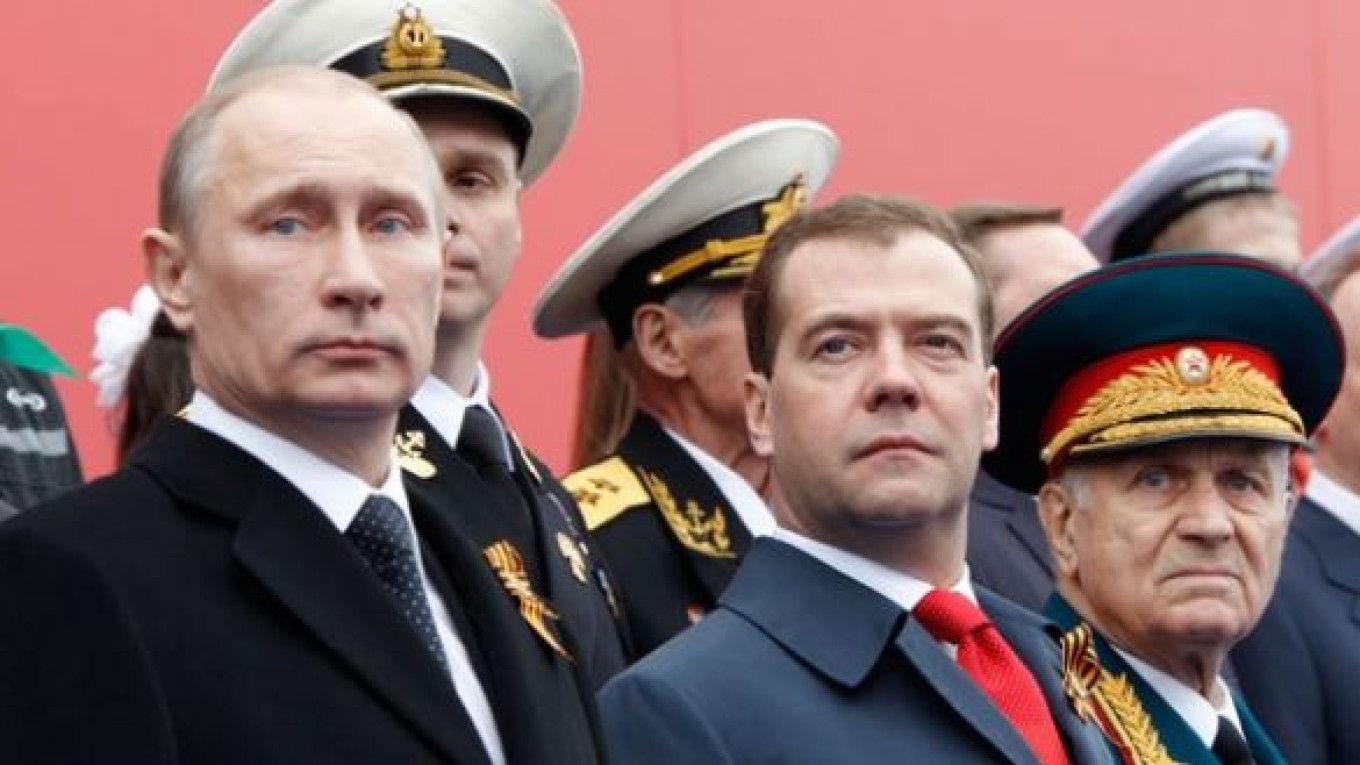Income declarations for 2012 for the president, members of the presidential administration, government officials and Federation Council officials were published on Friday, showing revenues that ranged from hundreds of thousands to hundreds of millions of rubles, and from one to several pieces of real estate.
In the overall picture, President Vladimir Putin and Prime Minister Dmitry Medvedev have more modest incomes, equal to 5.8 million rubles ($186,000) each.
Putin owns one apartment, one land plot, one garage and three Russian-made cars. Medvedev owns? one land plot, one apartment and two Russian-made cars.
According to the declarations, Putin's aide Yury Trutnev, a former natural resources minister, is the wealthiest official in the , with an income of 210.6 million rubles.
Currently, Trutnev and his wife jointly own a land plot, a dacha, a guest house, an industrial building, and six foreign-made cars, including a Porsche Cayenne Turbo, Maserati GranTurismo M145, Volkswagen Touareg and Nissan Patrol, as well as a four-wheeler and a snowmobile.
Among the other wealthiest Kremlin officials are Boris Titov, the Kremlin's business rights ombudsman, with 20.1 million rubles; children's ombudsman Pavel Astakhov with 19.2 million rubles; and Igor Levitin, Putin's adviser and former transportation minister, with 18.6 million rubles.
In the , First Deputy Prime Minister Igor Shuvalov is the leader in terms of income, with 226.4 million rubles. ?
In the , Senator Dmitry Ananyev, who was ranked 50th on Forbes list of Russian millionaires, is the richest, with a revenue of almost 700 million rubles.
This year, in keeping with two decrees signed by Putin in early April, state officials published their declarations using a new declaration form that requires information about foreign bank accounts, securities and property, as well as an explanation of where the money came from to buy the given .
Also for the first time this year, income and expense declarations of state officials will be checked, with presidential Chief of Staff Sergei Ivanov to report to Putin on the matter by Oct. 1.
Legislation prohibiting senior officials from having foreign assets, with the exception of real estate, passed the first reading in the Duma in February. It was submitted by Putin.
Some politicians doubt that the declarations actually increase public control over officials, however, saying officials can still conceal their real income, expenses and property, and that authorities are simply making a show of the fight against corruption rather than really fighting it.
In 2011, Russia refused to ratify Article 20 of the United Nations Convention against Corruption, which would have made illegal enrichment of officials a criminal offense. The convention has been effective since 2005 and has been ratified by 30 .
Sergei Levchenko, a State Duma deputy with the Communist Party, says he sees "more pretense" from authorities than a real desire to fight corruption, citing Russia's failure to ratify Article 20 of the UNCAC as "indirect proof," along with the failure of authorities to prosecute senior Defense Ministry officials implicated in ongoing large-scale corruption probes. ?
"I don't see much use in these things," Levchenko said about the income and expenses declarations. "There are officials and lawmakers who reveal everything, and then there is apparently also a possibility to not reveal everything," he said by telephone.
But Alexander Khinstein, deputy head of the State Duma's Committee for Security and Fighting Corruption, said the declarations were necessary "because society must control officials."
Khinstein said that while current Russian legislation allowed authorities to prosecute officials for illegal enrichment in certain cases, the ratification of Article 20 of the UNCAC would require large-scale legal amendments.?
Contact the author at n.krainova@imedia.ru
Related articles:
A Message from The Moscow Times:
Dear readers,
We are facing unprecedented challenges. Russia's Prosecutor General's Office has designated The Moscow Times as an "undesirable" organization, criminalizing our work and putting our staff at risk of prosecution. This follows our earlier unjust labeling as a "foreign agent."
These actions are direct attempts to silence independent journalism in Russia. The authorities claim our work "discredits the decisions of the Russian leadership." We see things differently: we strive to provide accurate, unbiased reporting on Russia.
We, the journalists of The Moscow Times, refuse to be silenced. But to continue our work, we need your help.
Your support, no matter how small, makes a world of difference. If you can, please support us monthly starting from just $2. It's quick to set up, and every contribution makes a significant impact.
By supporting The Moscow Times, you're defending open, independent journalism in the face of repression. Thank you for standing with us.
Remind me later.


